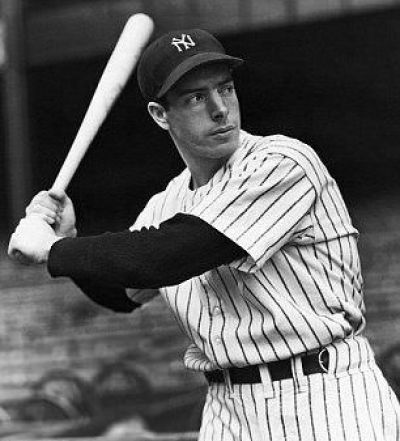Quella dell’italoamericano Joe DiMaggio potrebbe essere una comune storia di italiani di fine XIX secolo: figlio di pescatori originari dell’Isole delle Femmine in provincia di Palermo emigrati in America alla ricerca di migliore fortuna, cresce in una famiglia numerosa. A causa delle difficili condizioni economiche, è costretto suo malgrado ad aiutare il padre ed i fratelli che gestiscono un’attività di pesca che non gli piace, mentre fin da bambino si interessa al baseball. È proprio questa passione che segnerà la singolarità del destino dell’uomo in seguito definito “Il più grande giocatore di baseball vivente”. Approfittando dell’occasione offertagli da uno dei suoi fratelli - che lo raccomanda al dirigente della squadra di baseball dove lui stesso gioca – Joe diventa un idolo di qualsiasi appassionato dello sport maggiormente in voga negli Stati Uniti. Quando nel 1936 compare sul campo degli Yankees lo accolgono 25 mila bandiere tricolore issate dai suoi connazionali italoamericani.
How does an Italian fisherman rear, endear and ultimately prepare his gifted son to rewrite most of America’s Major League Baseball records and somehow rise up from the murky depths of the unforgiving sea to symbolize American baseball’s best in grace and power?
That’s the incredible story of Joe DiMaggio, a first-generation Italian kid, working the shores of Fisherman’s Wharf in northern San Francisco from dawn to dusk with his four brothers by order of Papa DiMaggio. DiMaggio gloriously experienced and benefitted from the American dream, the postwar promise, for himself and for his financially-challenged family of 11. “I would like to take the great DiMaggio fishing. They say his father was a fisherman. Maybe he was poor as we are and would understand,” memorably writes Ernest Hemingway in “The Old Man and the Sea” (1952). The old man empathizes with DiMaggio’s humble beginnings and presumes he grew up “poor” and would understand, the son of a fisherman.
Guiseppe and Rosalia DiMaggio had nine children, five boys and four girls. Joe was their fourth son and as Guiseppe’s namesake, naturally more was expected. The oldest sons, Tom and Michael, diligently followed their papa into the fishing business. The third brother, Vince, and the youngest, Dominic, decided against fishing full-time and chose to play baseball along with Joe. Both brothers would eventually play centerfield, as did Joe, in the major leagues.
Vince led the way into professional baseball. He played 10 seasons and was a two-time all-star with the Pittsburgh Pirates, retiring in 1946. Dom was a seven-time all-star with the Boston Red Sox, played 10 seasons and was considered to be one of the best centerfielders of his generation, retiring in 1953. Joe had retired earlier in 1951.
How did this unimaginable baseball blessing happen to the DiMaggio family? In the Italian American home they grew up in, Joe and his siblings spoke Italian, cooked Italian, married Italian, and acted Italian. Giuseppe was strict, relentlessly hard-working and a successful fisherman in the San Francisco area. And he expected nothing less from his five sons, wanting all of them to become fiercely-focused fishermen like the Sicilian men before them. Like other native Italian fathers of the 1940s and 1950s, Guiseppe was revered and even feared by his children. Guiseppe was Sicilian, born-and-bred, and he made it abundantly clear to his nine children that they knew and respected ‘what papa wants, papa gets.’ That decision was final in his house, “senza parole, capieci?” “No words, understand?”
Joe’s mother, Rosalia, was protective, intense and encouraging with all her children. Her Catholic devotion and prayers were a stabilizing factor for the DiMaggio family. Rosalia had a strong, motherly belief in Joe as a youngster that Guiseppe did not share, especially about fishing.
Joe showed very little enthusiasm about fishing with papa and his brothers. The smell would nauseate him and he would do anything to get out of cleaning his father’s boat, folding the nets or bundling up the “crab catch” that night at Fisherman’s Wharf. It was a dreaded and repetitive routine that Joe passionately hated. He would conveniently disappear, to Guiseppe’s disdain, prompting Guiseppe to lash out, calling Joe a “good-for-nothing bum,” “un disgraziato,” a disgrace, and “un magabonu,” a vilified vagabond.
“Italian sons were supposed to suffer shame and guilt for not following their fathers’ ways,” relevantly writes Andrew Rolle in his book, “The Italian Americans: Troubled Roots.” For Italian sons, following papa was often the only right thing to do or they would likely face estrangement from the family forever.
Joe dropped out of high school in the 10th grade and instead of working with papa and his brothers at the Wharf, he decided to sell bundles of newspapers and work at warehouses, offending Guiseppe’s hope for him to become a fisherman. Fortunately for him, Vince was soon signed by the San Francisco Seals, a minor league baseball team. Vince knew all too well about Joe’s baseball talents and convinced him to return to baseball. The rest happened almost magically for Joe as his flawless style was now on display and being touted by national baseball writers as pure, graceful and fluid. Joe’s ease and perfection on the field left fans awestruck and clamoring for more.
Joe DiMaggio, the Yankee Clipper, is indelibly etched deep into America’s sports consciousness. DiMaggio achieved nine World Series championships, was a 13-time all-star and garnered an astounding 56-game hitting streak with the Yankees – one of the greatest achievements in baseball history.
On the day of his passing in 1999, President Bill Clinton voiced these defining, memorable words to honor the venerable Joe DiMaggio: “This son of Italian immigrants gave every American something to believe in. He became the very symbol of American grace, power and skill.”
https://www.lagazzettaitaliana.com/people/9331-joe-dimaggio-how-the-son-of-an-italian-fisherman-became-the-symbol-of-american-baseball#sigProId6dc9ca5e2a




